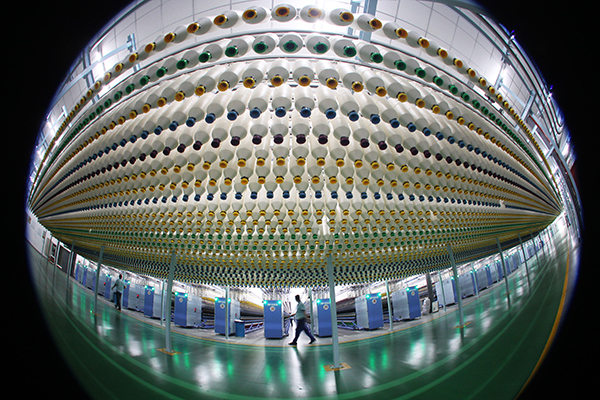Manufacturers in China urged to think smarter
 0 Comment(s)
0 Comment(s) Print
Print E-mail China Daily, March 25, 2016
E-mail China Daily, March 25, 2016
|
|
|
The smart manufacturing facilities in Jiangsu Dasheng Group Co Ltd, a textile company in Nantong, Jiangsu province. [Photo/China Daily] |
The sheer scale of the Chinese market gives the country an edge to develop smart manufacturing, said David Cruickshank, the global chairman of the professional services firm Deloitte Touche Tohmatsu Ltd.
But to succeed, he said, companies not only need to upgrade their systems but also have to extend the scope of smart manufacturing to the entire business.
His comments come as the central government is pressing ahead with the Made in China 2025 initiative to encourage companies to apply automation to build more intelligent manufacturing solutions that rely less on labor. It also encourages customization of goods, instead of focusing on mass production.
Globally, there are several versions of smart manufacturing: Germany's Industry 4.0 route starts from integrating hardware and software for the manufacturing process and leveraging Internet while in the United States, the concept of Industrial Internet refers to the integration of complex machinery with sensors and software.
Cruickshank said it is important to tailor each market with different approaches, taking account of current supply chain and infrastructure.
"There are many concepts ... To me the essence is it allows manufacturers to get very close to their end users and to have consumer input into what is being manufactured.
"The direct connection bears implication for distribution networks. For example, in the United Kingdom where I am based, high-street retailers are struggling (due to smart manufacturing)," he said.
China's biggest strength, according to Cruickshank, is its absolute scale. The huge market means the ability to scale up and respond to consumer trends quickly when you have hundreds of millions of consumers, he said.
"The scale of the market gives people opportunities to experience different models... Experimenting different models can happen very easily in China."
Lawrence Chia, CEO of Deloitte China, agreed, noting that most multinationals have competed each other in the Chinese market to experiment various techniques.







Go to Forum >>0 Comment(s)